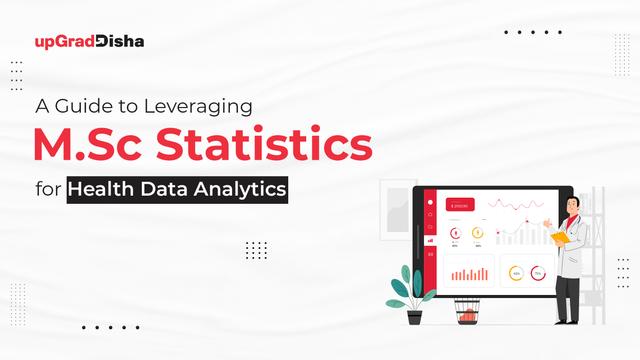A Guide to Leveraging M.Sc Statistics for Health Data Analytics
February 20th, 2024: 5 mins
|
This Article Explores:
|
Health data analytics is one of the swiftly developing areas in the field of statistics. It involves the processes of statistical analysis and health data interpretation, helping identify, assess, and resolve public health concerns. The more data becomes available, the greater the demand for professionals who can analyze and interpret this data by leveraging statistics in health sciences.
In 2024, analysts estimate the Telehealth Services Market in India will be worth USD 3.26 billion and grow at a CAGR of 23.95% between 2024 and 2029. By 2024, experts estimate AI utilization in healthcare to increase at an annual rate of 45%, demonstrating the industry's growing reliance on this technology.
Wondering how you can establish yourself as an expert in this growing field?
Obtaining an online Master of Science degree in Statistics can open the doors for you to acquire relevant skills and sufficient scope of knowledge you need to advance your career. In the following blog, we’ll explore the significance of statistics in healthcare, learning how students can leverage M.Sc data analytics for health-related applications.
Importance of Statistics in Health Data Analytics

Statistics can be harnessed as a powerful tool to help health data researchers extract important insights from complicated and diverse information, eventually enhancing patient care and optimizing healthcare systems. By utilizing statistical tools, analysts may find patterns, trends, and correlations that guide decision-making and promote innovation in the healthcare industry.
Statistics plays a key role in:
- Population health management: Big data analysis allows statistical models to define high-risk patients and create an action plan focused at the patient level to optimize patient care and improve the population's health.
- Preventative care: Data analytics can reveal risk factors that are likely to be overlooked or missed out. This helps assess real-world patient data and current disease trends, enabling the prevention of potential health issues or recommending personalized treatment actions
- Cost savings and efficiency: Statistical analysis can be helpful for healthcare companies to make informed decisions based on data-driven insights, helping them limit costs and efficiently utilize resources.
- Research and development: Statistical methods are indispensable for evaluating clinical trials and other research findings and, at the same time, assist in quickening the process of medication discovery and improving the use of medical tools.
Statistical Techniques for Health Data Analysis
The field of health data analysis includes a variety of statistical approaches for assessing and drawing conclusions from healthcare data. Some of the most significant statistical techniques for health data analysis are:
- Systematic reviews
- Economic evaluation
- Cost-effectiveness modeling
- Decision analytic modeling
- Markov models
- Utility and patient-reported outcomes data analysis
- Quality Adjusted Life Year (QALY) evaluation
- Health economics
- HTA policy development
- Data synthesis and evidence-based decision-making
These methodologies are critical for analyzing healthcare resources and expenditures, revealing the pattern and trend in the data, and making assumptions and forecasts on patient outcomes. Data derived from these methodologies assist clinicians in coming up with evidence-based decisions and providing patients with individualized professional treatment.
Some examples of big data analytics in health research:
Predictive analytics: Predictive analytics is being utilized to avoid hospital readmissions, monitor population health, anticipate illness onsets, and forecast appointment no-shows.
Electronic health records (EHRs): EHRs are utilized to collect and analyze patient data, offering insights for healthcare practitioners.
Real-time alerting: Real-time alerting is harnessed to give quick treatment and reduce drug misuse within medical facilities.
Telemedicine: Telemedicine is used to monitor patients at home and reduce unnecessary hospital trips.
Fraud detection: Analytics can be utilized in the field of fraud detection, helping healthcare providers to boost data security.
Navigating the Complex Field of Data-driven Healthcare with M.sc in Statistics

M.Sc Statistics Program Powered by Dr MGR University
Online Master of Science (M.Sc.) degree in Statistics, such as the one offered by Dr. MGR University, aims to educate students with advanced knowledge and abilities in statistical science and its application to real-world issues. The program offers a comprehensive curriculum that enriches learners with a mathematical and statistical mindset. This approach is significant for identifying and generating domain-specific reforms, such as the ones observed in the field of data science and healthcare analytics. The program normally covers the following topics:
- Real Analysis & Linear Algebra
- Probability and Distributions
- Sampling Techniques
- Statistical Inference
- Statistical Quality Control and Reliability
- Trend Analysis and Index Numbers
- Stochastic Processes and Applications
- Multivariate Analysis and Non-Parametric methods
The program structure covers a wide range of statistical concepts and techniques, preparing students for careers in data analysis. As you accomplish navigating the challenging terrain of this degree, you will have the opportunity to work across several roles, including data scientist, healthcare analyst, clinical intelligence analyst, and more!
Conclusion
With the arrival of new technologies such as Big Data Analytics, AI, IoT, and genAI, Indian healthcare is set to witness a new dawn, marking the emergence of better patient experience, operational efficiency, and innovation. As these technologies are pushing healthcare systems to override obsolete practices with the power of statistics and data, skilled professionals, again, are in demand to facilitate this transformation.
Getting an M.Sc in Health Statistics is a great way to take the first step in the field of health data analytics. As the need for professionals who can analyze and interpret health data grows, there is no better time to consider this career option.
Want to make the right choice? Let upGrad Disha guide you!
